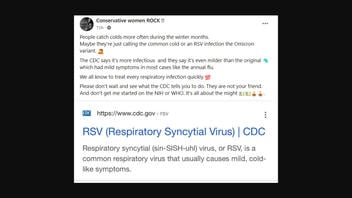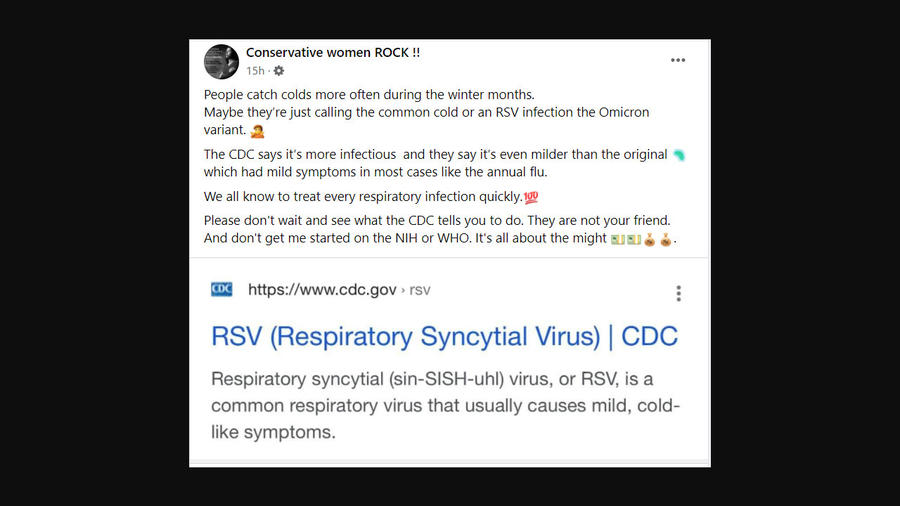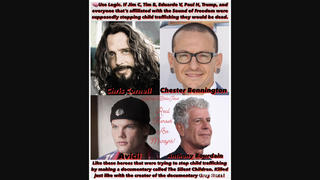
Is the CDC just calling the common cold or RSV the omicron variant? No, that's not true: The omicron variant is a mutated version of the original COVID-19 virus. While the common cold and RSV (respiratory syncytial virus) are viral infections, they are different viruses than COVID-19 (SARS-CoV-2), which is a novel coronavirus, a new type that had not been seen in humans before 2019. RSV was discovered in 1956. The cause of the common cold was identified in the 1950s, but the disease appears to have been around since early in human history.
The claim appeared in a Facebook post (archived here) on December 20, 2021, under the title "People catch colds more often during the winter months." It opens:
People catch colds more often during the winter months.
Maybe they're just calling the common cold or an RSV infection the Omicron variant. 🤷
The CDC says it's more infectious and they say it's even milder than the original 🦠 which had mild symptoms in most cases like the annual flu.
We all know to treat every respiratory infection quickly.💯
Please don't wait and see what the CDC tells you to do. They are not your friend. And don't get me started on the NIH or WHO. It's all about the might 💵💵💰💰.
This is what the post looked like on Facebook on December 20, 2021:
 (Source: Facebook screenshot taken on Mon Dec 20 22:12:45 2021 UTC)
(Source: Facebook screenshot taken on Mon Dec 20 22:12:45 2021 UTC)
The Facebook post by "Conservative women ROCK !!" suggests there is no omicron variant of COVID, accusing the Centers for Disease Control and Prevention of possibly renaming RSV or the common cold. The group's rationale is omicron is "even milder than the original." Despite early reports suggesting less severe symptoms, experts like World Health Organization (WHO) Chief Scientist Soumya Swaminathan told reporters on December 20, 2021, that it's a risky assumption:
It is probably unwise to sit back and think 'this is a mild variant, it's not going to cause severe disease,' because I think with the numbers going up all health systems are going to be under strain.
The common cold
All three are viral infections and may have overlapping symptoms, but they're also unique. This is how the American Lung Association identifies a cold:
- Colds are minor infections of the nose and throat caused by more than 200 different viruses. Rhinovirus is the most common cause, accounting for 10 to 40 percent of colds. Other common cold viruses include coronavirus and respiratory syncytial virus (RSV).
- A cold may last for about one week, but some colds last longer, especially in children, the elderly and those in poor health.
- In the United States, colds account for more visits to the doctor than any other condition.
- Adults get an average of two to four colds per year, mostly between September and May.
- Young children suffer from an average of six to eight colds per year.
- Colds are highly contagious. They most often spread when droplets of fluid that contain a cold virus are transferred by touch. These droplets may also be inhaled.
While some colds are caused by a coronavirus, it's not the same virus that causes COVID-19. The National Institutes of Health describes it this way:
The virus responsible for the COVID-19 pandemic, SARS-CoV-2, is part of a large family of coronaviruses. Coronaviruses usually cause mild to moderate upper-respiratory tract illnesses, like the common cold. However, SARS-CoV-2 can cause serious illness and even death.
As of December 20, 2021, more than 5.3 million people had died globally from COVID-19, according to statistics compiled by Johns Hopkins University since the start of the pandemic in late 2019. Colds aren't generally considered to be deadly and have a lower mortality rate than the seasonal flu, which kills up to 650,000 people globally each year, according to the WHO.
One of these is not like the others
The WHO separates the coronaviruses this way:
Coronaviruses (CoV) are a large family of viruses that cause illness ranging from the common cold to more severe diseases such as Middle East Respiratory Syndrome (MERS-CoV) and Severe Acute Respiratory Syndrome (SARS-CoV). A novel coronavirus (nCoV) is a new strain that has not been previously identified in humans.
The new coronavirus, 2019-nCOV or COVID-19, is a respiratory virus that spreads primarily from person to person through small droplets from the nose or mouth, which are expelled when a person with COVID-19 coughs, sneezes, or speaks. These droplets are relatively heavy, do not travel far and quickly sink to the ground. People can catch COVID-19 if they breathe in these droplets from a person infected with the virus.
Telling the difference
In their initial stages COVID-19, RSV and the common cold have similar symptoms, but all are genetically unique. There are tests for RSV and COVID to officially diagnose the diseases. The Mayo Clinic has a web page spelling out the differences in how the illnesses manifest themselves.

















